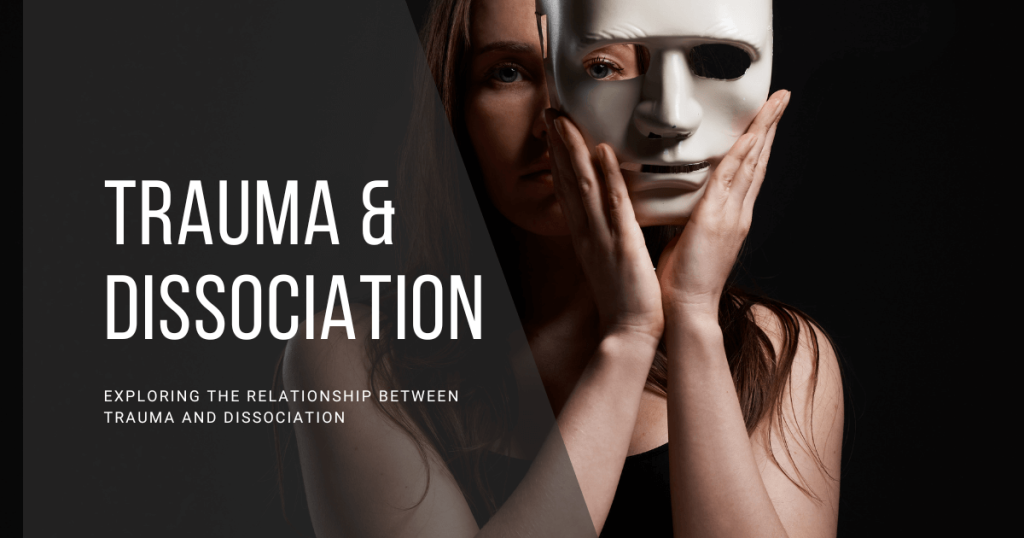Trauma and dissociation are two interconnected concepts that can significantly impact a person’s mental health. Trauma refers to a deeply distressing or disturbing event that overwhelms an individual’s ability to cope. Dissociation, on the other hand, is a coping mechanism that the brain uses to protect itself from the overwhelming emotions associated with trauma.
When an individual experiences trauma, their brain may dissociate as a way to cope with the overwhelming emotions associated with the trauma. Dissociation allows the individual to detach from their thoughts, feelings, and experiences, which can reduce the emotional intensity of the trauma.
However, dissociation can become maladaptive if it persists long after the trauma has ended. Chronic dissociation can lead to several mental health problems, such as dissociative disorders, depression, anxiety, and substance abuse.
It is important to note that not everyone who experiences trauma will develop dissociation, and not everyone who experiences dissociation has a history of trauma. However, trauma is a common cause of dissociation, and understanding the connection between trauma and dissociation can help individuals who are struggling with dissociative symptoms.
In this blog post, we will explore the connection between trauma and dissociation, and how understanding this connection can help those who are struggling with dissociation due to trauma.
Keywords: Treatment options for mental health conditions, Coping mechanisms for overwhelming emotions, Healing from trauma and dissociation, Understanding the connection between trauma and dissociation, Effects of trauma on mental health, Effects of dissociation on mental and physical health, Trauma-related dissociation in children, Therapy options for trauma and dissociation, Support groups for trauma and dissociation, Seeking treatment for mental health conditions, Strategies for managing dissociative symptoms, Importance of self-advocacy in mental health, Path to healing and growth after trauma, Reclaiming your life after trauma, Support for individuals in crisis and thoughts of suicide, Reaching out for help in times of need, Understanding and compassion for trauma survivors, Effective approaches for treating trauma and dissociation, Building a future filled with hope and resilience
Understanding Trauma
Trauma is a deeply distressing or disturbing event that overwhelms an individual’s ability to cope. It can leave a lasting impact on their physical, emotional, and psychological well-being. Traumatic events can take many forms, including physical, emotional, or sexual abuse, neglect, natural disasters, accidents, and life-threatening events. It’s important to note that trauma is subjective, meaning that what may be traumatic for one person may not be traumatic for another. Additionally, trauma can be classified as acute or chronic. Acute trauma refers to a one-time event that happens suddenly, such as a car accident or an assault. Chronic trauma, on the other hand, is ongoing and can last for years, such as childhood abuse, domestic violence, or living in a war zone.
If you are an adult, chances are you have experienced some level of trauma in your life. Trauma is the body’s physical, emotional, and psychological response to a distressing incident. According to the National Council for Mental Wellbeing, approximately 70% of adults have experienced at least one traumatic event. If you’re unsure whether you’ve experienced trauma, it can be helpful to reflect on whether you have been involved in or witnessed any of the following:
- Community violence
- Domestic abuse
- Natural disasters
- Serious illness or injury
- Abandonment
- Sexual assault
- War or conflict
Please note that this is not an exhaustive list, and experiencing these events does not automatically mean that trauma has occurred. However, these incidents are often associated with traumatic experiences. Walking away from a distressing event can leave individuals with various conditions, including:
- Post-Traumatic Stress Disorder (PTSD): This is a disorder that can develop in people who have a difficult time recovering from experiencing or witnessing a terrifying event. Individuals with PTSD may experience intrusive thoughts, nightmares, flashbacks, and emotional numbness.
- Acute Stress Disorder (ASD): Similar to PTSD, ASD also results from experiencing or witnessing a traumatic event. However, ASD symptoms typically last for a month or less.
- Secondhand Trauma: This refers to the emotional duress experienced by individuals who witness someone else going through trauma. It can have significant psychological impacts on observers.
- Dissociative Identity Disorder (DID): This condition arises as a reaction to trauma, where individuals subconsciously avoid memories and feelings associated with the traumatic experience. DID is characterized by the presence of multiple distinct identities or personalities within one person.
These conditions are essentially trauma-induced coping mechanisms that the body and mind employ to survive. Our bodies have an innate capacity to protect us, and following a traumatic event, they reprogram themselves to respond in a survivalist manner when triggered by reminders of the trauma.
The Effects of Trauma
Trauma can have long-lasting effects on a person’s mental and physical health. The effects can vary from person to person and depend on several factors, such as the type and severity of the trauma, the age at which the trauma occurred, and the support available after the trauma. Here are some common effects of trauma:
- Depression: Trauma can contribute to the development of depression, which can manifest as feelings of sadness, hopelessness, and worthlessness. Depression can also cause physical symptoms like fatigue, insomnia, changes in appetite, and difficulty concentrating.
- Anxiety: Trauma can trigger anxiety disorders, leading to excessive worry, panic attacks, and physical symptoms such as a racing heartbeat and shortness of breath. Individuals may constantly feel on edge or have difficulty relaxing.
- Substance abuse: Trauma can increase the risk of substance abuse as individuals try to numb their emotional pain or cope with distressing memories. Drugs or alcohol may provide temporary relief but can lead to addiction and further exacerbate mental health issues.
- Physical health problems: Trauma can impact physical health, contributing to chronic pain, headaches, gastrointestinal issues, and other somatic symptoms. The mind-body connection plays a significant role, and unresolved trauma can manifest as physical ailments.
Understanding Dissociation
Dissociation is a psychological process that allows an individual to disconnect from their thoughts, feelings, memories, emotions, or reality. It is not a guaranteed symptom of trauma, but it is likely and is found in 12-30% of those with diagnosed PTSD. Dissociation, which is much more common in people who have experienced childhood trauma, can take many forms, such as depersonalization, derealization, or dissociative amnesia. Dissociation can be a normal response to stress, such as daydreaming, getting lost in a book, mindlessly scrolling online, or zoning out during a boring lecture. However, dissociation can also become a maladaptive coping mechanism in response to trauma.
Our bodies are built for survival. Traumatized bodies may reprogram themselves to dissociate because they need a way to regulate themselves. Constantly conceptualizing and processing trauma is not something the mind can handle, so the body intervenes by blocking out those memories, almost like pulling a window shade down over that which is too massive and painful to process.
Unfortunately, dissociative subtypes in mental health disorders are commonly undiagnosed. This is sadly due to the lack of training medical professionals receive in identifying DID and other forms of dissociation. This lack of training can result in skepticism, disbelief, and diagnostic errors. It can take the patient up to twelve and a half years of six or more clinicians before receiving a proper diagnosis. In the meantime, this lack of diagnosis can cause the patient impaired functioning, chronic health issues, hospital stays and healthcare utilization, re-victimization, self-harm, and thoughts and attempts of suicide. Not surprisingly, these risk factors drastically lower once the dissociative subtype(s) is recognized and treated.
It is important to always advocate for yourself with medical professionals if you know you’ve experienced trauma and find yourself tapping out in the various ways common with dissociation. It is frustrating, but self-advocation is the first step in obtaining official mental-health diagnoses.
The Effects of Dissociation
Dissociation can significantly impact both mental and physical health, with varying effects from person to person. The severity and duration of dissociation, as well as the support received during and after dissociative episodes, can influence the specific outcomes. Here are some common effects of dissociation:
- Difficulty concentrating: Dissociation can make it challenging to concentrate on tasks, remember details, or maintain focus. It can feel like the mind is drifting or disconnected from the present moment.
- Feeling detached from reality: Individuals experiencing dissociation may feel disconnected from their surroundings as if they are observing their own life from a distance. This can create a sense of unreality or a dream-like state.
- Difficulty regulating emotions: Dissociation can disrupt emotional regulation, making it challenging for individuals to manage and express their feelings. They may struggle to identify and cope with emotions effectively.
- Self-harm: In an attempt to ground themselves or cope with overwhelming emotions, some individuals may resort to self-harming behaviors. This can serve as a way to feel more present or release pent-up emotions.
- Substance abuse: Dissociation can increase the risk of substance abuse as individuals seek ways to cope with or escape from their dissociative symptoms. Substance use can provide temporary relief but can further complicate mental health issues.
- Relationship problems: Dissociation can strain relationships as individuals struggle to connect with others or effectively communicate their emotions. This difficulty in establishing and maintaining emotional connections can lead to conflicts and misunderstandings.
Understanding these effects of dissociation is crucial in providing support and empathy to individuals experiencing dissociative symptoms. Encouraging professional help, such as therapy or counseling, can assist in managing dissociation and addressing underlying trauma. Creating a safe and validating environment where individuals feel understood and supported can foster healing and growth.
How Does Trauma-related Dissociation Affect Children?
When it comes to trauma-related dissociation in children, it’s important to recognize the subtle signs that may manifest in their behavior, emotions, and interactions. Children who have experienced trauma may display various dissociative symptoms as a way to cope with overwhelming experiences.
- They may seem detached, withdrawn, or have difficulty connecting with others.
- They may struggle with memory and have gaps in recalling important details or events.
- Some children may exhibit sudden shifts in mood or display inconsistent emotions.
- They might engage in escapist behaviors, like daydreaming excessively or engaging in fantasy play to mentally detach from their surroundings.
It’s crucial for adults to be attentive and compassionate observers, looking for patterns or changes in a child’s behavior that may indicate dissociation as a response to trauma. By creating a safe and supportive environment, validating their experiences, and providing professional help when needed, we can offer the understanding and care necessary to help children heal from trauma-related dissociation.
Treatment for Trauma and Dissociation
Treatment for trauma and dissociation can vary depending on the severity and duration of symptoms. However, some common treatments for trauma and dissociation include:
- Therapy: Therapy is a common treatment for trauma and dissociation. Therapy can help individuals process their trauma, learn coping skills, and develop healthy ways of managing their emotions. These methods assist in retraining the brain and body to respond to its outside environment in a healthy and adaptive way:
- Eye Movement Desensitization and Reprocessing (EMDR) – a technique used to help you process your trauma through specific eye movements.
- Cognitive Behavioral Therapy (CBT)– a psychological treatment that works at reprogramming thinking patterns
- Somatic Therapy / Mind-body techniques – Mind-body techniques, such as yoga, meditation and mindfulness, acupuncture, massage therapy, and reiki can help individuals regulate their emotions and reduce dissociative symptoms.
- Brief Eclectic Therapy –A psychodynamic approach that centers on alternating feelings of guilt and shame surrounding the traumatic event(s)
- Medication: Medication can be used to treat symptoms of trauma and dissociation, such as depression, anxiety, and sleep problems.
- Support groups: Support groups can provide individuals with a safe and supportive environment to share their experiences and connect with others who have experienced trauma or dissociation.
When individuals embark on the journey of seeking treatment for their mental health condition, it becomes crucial for them to prioritize what resonates best with their needs and preferences. Seeking guidance from trusted professionals such as primary care physicians or therapists can provide a valuable starting point. In cases where access to clinicians is limited, conducting research on verified medical platforms online can offer valuable insights and information.
There may be moments when the weight of past trauma feels overwhelming, making the healing process seem insurmountable. However, it is important to remember that healing is possible. While the path to recovery may be challenging and require sustained effort, achieving peace and transformative shifts in perspective is within reach. Ultimately, it is up to each individual to commit to doing the necessary work for their healing journey. By embracing the process and taking proactive steps, individuals can move closer to a place of healing, growth, and personal empowerment.
Conclusion
In conclusion, trauma and dissociation have a profound impact on mental health, with trauma often leading to dissociation as a coping mechanism. The long-term effects of chronic dissociation can contribute to various mental health challenges, including dissociative disorders, depression, anxiety, and substance abuse. Recognizing the link between trauma and dissociation is crucial for individuals who are struggling with dissociative symptoms, as seeking treatment can help them manage these symptoms and enhance their overall well-being.
Remember, while trauma may weigh heavily on your life, it doesn’t have to define you. There are effective treatment approaches and coping strategies available, and you’re not alone in your journey toward healing. Engaging with supportive communities of individuals who have also experienced trauma can provide invaluable companionship and understanding along the way.
If you ever find yourself in a crisis and having thoughts of suicide, reach out for help. You can call the National Suicide Prevention Hotline at 1-800-273-TALK (8255) or dial 988 to contact the Suicide and Crisis Lifeline. Both of these numbers are toll-free and provide immediate support from trained professionals.
Remember, healing is possible, and reaching out for support is an important step toward reclaiming your life. You deserve care, compassion, and a future filled with hope.
Please reach out if you would like me to explore this concept or related topics further with you and your organization.







